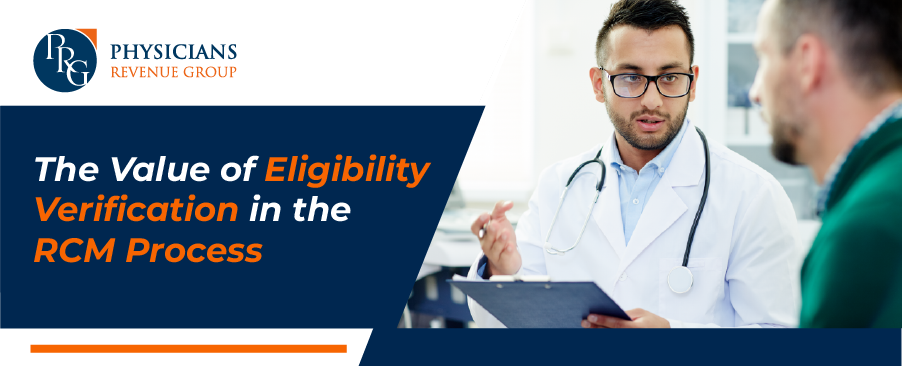
Email: info@prgmd.com | Call: +1 (630) 242-6474
Business hours: 9:00 to 5:00 | Monday to Friday
Email: info@prgmd.com | Call: +1 (630) 242-6474
Business hours: 9:00 to 5:00 | Monday to Friday

Table of Contents
ToggleThere is no doubt about the seriousness and value of eligibility verification in RCM. Plus, there are a few options available for verification of patient availability, and all of them, in one way or another, will impact the revenue stream in varying ways. The primary concern is how well the mode of patient verification beforehand shall improve the payment rate from both patients and insurance providers. Another consideration – especially on the accounts of prompt medical billing services – is the time spent in the verification process. For what’s worth, outsourcing healthcare RCM and its related operations is a better option than catering these processes in-house, where manual verification can cost a lot in terms of employee time, in contrast to electronic verification.
Considering the value of eligibility verification in RCM – A patient’s insurance verification process must take place before their visit or admission to the medical facility. Doing so can eliminate instances of claim rejections and introduce hassle-free processing of the upcoming steps. If the claims face rejection at the first submission, it gets tiring to file them again and might lead the practice to a dead end for payments.
Considerations for Patent Eligibility Verification Process
The three essential considerations include:
Eligibility verification teams must determine if a patient’s information is correct and make the necessary changes if needed. Even the tiniest errors lead to claim rejections; therefore, the teams need to buckle down to obtain accurate patient information.
The general patient information includes:
Checking patient eligibility before appointments significantly impacts how quickly healthcare practices receive full payment for their services. By confirming insurance coverage in advance, practices can provide patients with estimates of their financial responsibility. This approach increases the likelihood of patients arriving prepared to settle their bills or establish payment plans.
Patients may not always have accurate information about their insurance coverage. The complexities and frequent changes in insurance details can lead to misunderstandings. Patients might be unaware of changes in their deductibles or other factors affecting out-of-pocket expenses. Promptly informing patients allows them to plan for additional costs or collaborate with the practice to set up a manageable payment schedule. Most patients prefer timely bill payments, and verifying patient eligibility helps practices assist patients in avoiding unexpected large bills.
Conducting eligibility verification ahead of time also protects practices from situations where insurance coverage has lapsed, or policies do not cover specific services. Such preventive measures ensure that practices can navigate potential payment issues with a clearer understanding of the patient’s coverage status.
The most common reason for denied claims is incorrect information. Be it by accident or intentionally, coding and billing errors are the most common reasons for claims denials due to incomplete, missing, or incorrect information.
It is a strategic process that aims to resolve and unmask problems that lead to claim denials.
Share:
Categories
Recently Added

What is an ABN in medical billing?

What does a Clearinghouse do During Claims Submission?

What is EOR in Medical Billing?
We Would Love to Assist You!
We treat your data confidentially and don’t share any information with a third party.